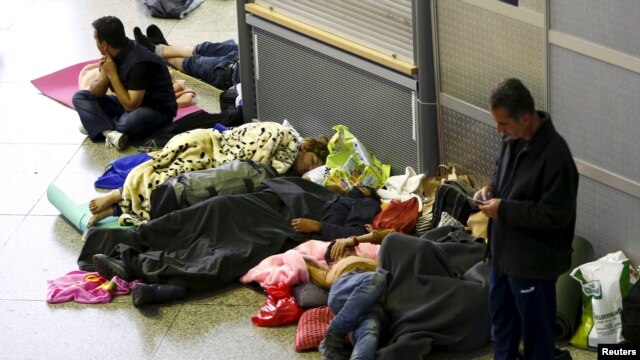Germany Suspends Participation in Schengen, Halts Trains
|
|
Date: 9/13/2015 6:03:24 PM
Sender: VOA
|

Migrants sleep in the hall of main railway station in Munich, Germany, Sept. 13, 2015.
WASHINGTON—
Germany has temporarily suspended participation in the much-vaunted European Union system of passport-free movement between member countries and has imposed border controls, saying it was forced to do so to limit the influx of refugees from war-torn countries, mainly Syria and Iraq.
The announcement Sunday by the country’s interior minister, Thomas de Maiziere, came on another fast-moving day in Europe’s migration crisis, with Germany halting all trains for 12 hours with its neighbor Austria - the main conduit through which 450,000 refugees have arrived in Germany this year.
Analysts predicted the halting of trains would prompt more desperate scenes on the Austrian-German border, as tens of thousands of refugees try to enter Germany by any means possible.
“Germany is temporarily introducing border controls again along internal borders. The focus will be on the border with Austria at first," de Maiziere said Sunday. “The aim of these measures is to limit the current inflows to Germany and to return to orderly procedures when people enter the country.”
The suspension of German participation in passport-free movement between member countries came as Germany's federal states warned they are struggling to handle the refugee influx, and pushed back on German Chancellor’s Angela Merkel’s decision to welcome hundreds of thousands of refugees.
The Christian Social Union, the mainly Bavarian sister party of Chancellor Merkel’s Christian Democratic Union in the governing coalition, also upped its criticism of the German leader’s move to relax the rules for Syrian asylum-seekers wanting to settle in Germany. In rare direct criticism of the government, leading members the CSU turned on Merkel, saying she is making an “unparalleled historical mistake.”
Horst Seehofer, CSU leader, told Spiegel magazine: “It was a mistake that will occupy us for a long time yet. I see no possibility of putting the stopper back into the bottle.”
The mayor of Munich, Dieter Reiter, announced the city’s capacity to cope with arriving refugees is exhausted.
Germany’s decision to suspend its participation in the passport-free program is likely to anger other EU members - especially Belgium and France, who have threatened several times since 2011 to do the same in response to Italy handing out “humanitarian passports” to refugees and economic migrants.
The Italian move was in response to the refusal of other EU member countries to help share the refugee burden - a demand now being made by Germany.
France and Belgium pulled back from breaking the rules of the Schengen treaty on open borders which was agreed to in 1995, and set out to eliminate frontier checks among its members and allowed foreign visitors to travel throughout the “borderless” area using one visa.
Eurocrats have feared that the migration crisis rocking the EU ultimately will threaten the future of the continent’s passport-free zone.
Last month after the thwarted attack on a train from Amsterdam to Paris, Belgian Prime Minister Charles Michel called for review of the Schengen rules, urging the imposition of checks on passengers’ identity and luggage. Defenders of the system - mainly those who want greater EU integration - fear any step back from passport-free movement will undermine the whole project they support.
The pro-EU Economist magazine last month warned: “Schengen is among the most visible manifestations of European unity; its erosion would send a powerful signal.”
German police started to mount patrols at crossing points with Austria Sunday afternoon and German officials say checks may be launched on the country’s borders with Poland and the Czech Republic. The Czech Republic said it would increase controls on its border with Austria.
Germany’s ad hoc Schengen suspension will serve as the backdrop for what analysts say is likely to be a fractious meeting Monday of EU interior ministers in Brussels, at which German and French officials will support a burden sharing proposal unveiled last week by Jean-Claude Juncker, the European Commission president.
Under the Juncker plan, there would be a new compulsory system to redistribute 160,000 asylum-seekers between the EU’s 28 members allocated to each country on the basis of its size and wealth.
Central European members such as Hungary, Poland and the Czech Republic have criticized the scheme, saying they will not agree to it.
Hungary’s President Viktor Orbán told Germany Bild newspaper Sunday: “These migrants are not coming our way from war zones, but from camps in Syria’s neighbors. So these people are not fleeing danger and don’t need to be scared for their lives.” |
|
| |
